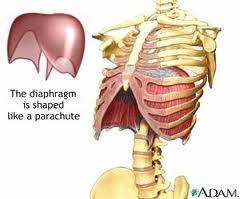SHARES

“I used to have hiccups often at a younger age. I don’t think I’ll ever forget that. My dad must be crazy enough to jump scare me. Somehow, his folk medicine works. But, there ought to be a better way, right?” Brian, 18, wonders why hiccups happen and how do we stop it.
Understanding how Hiccups Happens
Our body has a big flat sheet of muscle between our lung and stomach, called diaphragm. This big muscle moves up and down to draw air into and out of our lungs. In this sense, the nerves that control such movements share a common path with our stomach, food passage, throat, the wall behind our nose, and even our heart.
During a hiccup, the big muscle (diaphragm) contracts suddenly to push huge amount of air out of our lungs for a split second. As the air rushes out through our windpipe, a high-pitched “hic” is produced at the voice box. A lot of factors can cause this sudden contraction. It can be due to some irritation on the muscle itself, or on other body parts that share a common nerve pathway (eg. your food passage and heart). Sometimes, the nerve highway gets disturbed, and on very rare occasion, the brain.
Ways to Stop or Prevent Hiccups
1. Holding Breath, Gasping and Fast Breathing
A common way to stop hiccup is to hold our breath long enough (~20 seconds) to make our diaphragm becomes less sensitive to small irritations/changes. This is similar to yawning or gasping in horror. Sometimes, the opposite works as fine. We can breath in and out rapidly to numb our diaphragm from reacting to small stimulus.
2. Distracting Our Nerves
Most folk medicine remedies work by distracting the nerves to make the diaphragm less sensitive. These vary widely from smelling pungent ammonia, biting lemon, sipping ice cold water, swallowing coarse sugar granules, gargling, and even pulling the tongue. Sometimes, rubbing the neck and shoulder works too. This is because that skin area shares a common nerve route with diaphragm too.
3. Lean Forward with Knees Up to Chest
This increases pressure in the tummy and push onto our diaphragm for an extended period of time. As a result, the diaphragm gets less reactive over time.
4. Avoid Sudden Change in Temperature
Getting into a cold shower abruptly or entering a very cold room can trigger hiccup. This can be especially true when you just had a hot meal. When cold air comes to the mix, you are essentially tingling your nerves.
5. Pay Attention to What and How You Eat
Eating too fast or overeating can make your stomach distend too much and too quickly. This can irritate your diaphragm and trigger hiccup. Also, we can easily take in too much carbonated drink. The gases released can balloon our stomach rapidly.
Likewise, certain food may tickle our senses and set off bouts of hiccup. For instance, taking hot and cold food, spicy food, alcohol, etc and add to the mix, a stick of cigarette smoke.
6. Treat Stomach Acid Reflux (Heartburn) or GERD
Irritation of the food passage by stomach acid can cause hiccup. Sit up after meal for about 3 hours to prevent back flow of acid. Also, note that food high in fat and protein may take more than 3 hours to digest.
In this context, indigestion is a common cause for heartburn. Therefore, keep a distance from potential causes of poor digestion such as infection, stress, smoking, alcohol, caffeine, chocolate etc.
Conclusion
In short, hiccups are usually harmless and go away in time. More often than not, hiccups occurs when our diaphragm overreacts to rapid changes and irritant. However, if your hiccups persist for longer than it should (~48 hours), make sure you get help from your doctor to find out the cause.
Find a GP/Family Doctor in Malaysia, on GetDoc
Find a GP/Family Doctor in Singapore, on GetDoc
References:
1. Chang FY, Lu CL. Hiccup: mystery, nature and treatment. J Neurogastroenterol Motil. 2012 Apr; 18(2):123-130.
2. Wikes G. Hiccups [Medscape]. WebMD LLC. 2020. (Available from: https://emedicine.medscape.com/article/775746-overview; last updated on 2017 Dec 29; last accessed on 2020 Mar 17)
by Chang Xian
View all articles by Chang Xian.







